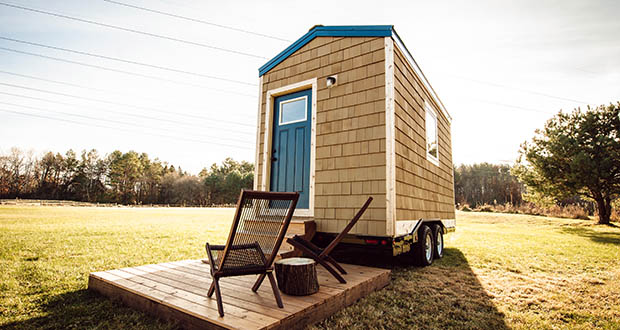
Finance & Commerce– Plywood sheets used to shield storefronts from the recent civil unrest in the Twin Cities may find new life in another form of shelter or protection: miniature rental homes for people living with homelessness.
Settled, a Twin Cities-based homeless advocacy group, is asking for donations of storefront plywood and other materials to help build the tiny homes — known as “Sacred Settlements” — on church properties.
“It’s a simple message: We just want to take something that was used for protecting our buildings and use it to create something new,” Anne Franz, co-founder of Settled, said in an interview Wednesday.
“We have had volunteer teams go out and directly ask business owners if they are willing to donate this,” Franz added. “We have been in contact with contractors who provided the service. There are a variety of methods we are using to connect with the people who are making decisions about where this valuable wood goes and putting it in a centralized place so we can use it in these homes this year.”
Gabrielle Clowdus, a co-founder of Settled, said the response has been encouraging.
“We have contacted businesses. Some have already taken [the plywood] off and it’s just sitting by their dumpster,” said Clowdus, a Ph.D. candidate in housing and research fellow at the University of Minnesota Center for Design. “Many think this is a fantastic idea and think, ‘We should absolutely put it to good use.’”
Founded in 2018, Settled is working with Faith Lutheran Church on a tiny house settlement on the church’s property in Forest Lake, and is in final approval for a pilot settlement at an undisclosed location in St. Paul.
The group hopes to wrap up work on its first settlement before winter.
The settlements would feature rental houses about 8.5 feet by 16 feet in size, according to Settled. Donated plywood can shave $450 to $500 off the cost of a typical house, which costs about $20,000 to $40,000 to build with help from volunteer labor, Clowdus said.
The Sacred Settlement model offers private space — as well as shared kitchen, dining, bathrooms, laundry and other areas — within a community, according to Settled. A religious organization manages the land to maintain standards for safety and welfare.
Community advocates and trained volunteers live alongside the formerly homeless residents to “ensure a thriving settlement,” while the use of church property “reduces or eliminates the cost of land to enable development, and is protected under a federal land use law,” the group said.
The organization takes what it calls a “community first” approach to ending homelessness. That means, among other things, it connects residents with “sustainable housing, purposeful work, and a supportive community,” the group said.
In addition, it piggybacks on the tiny house movement, which has spawned “two or three dozen” villages with miniature homes across the nation, Clowdus said.
Not everyone is ready to jump on board with the movement. Barriers to success include not-in-my-backyard sentiment, as well as restrictive zoning laws. Settled relies on faith-based organizations for “zoning-exempt” sites and other resources, Clowdus said.
“Our hope is to get the first one going and there’s a wave of people that visit, and we start to take some of the fear away,” Clowdus said. “Nimbyism is all about fear, fear of the unknown.”
Though the group is focusing on the projects in St. Paul and Forest Lake for now, Clowdus believes the model can be replicated in communities across the state.
“Our hope is that this is a movement that we can look back on in 20 years and say, ‘Remember when there were people living in homelessness for decades?’ That doesn’t exist anymore,” she said.



